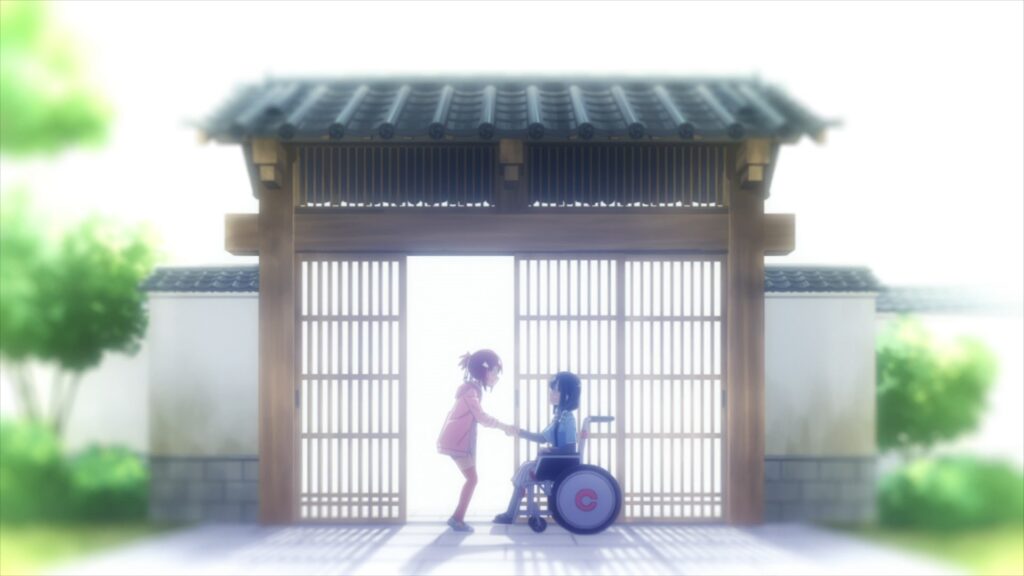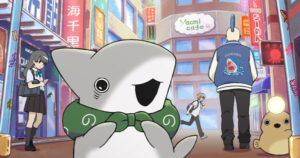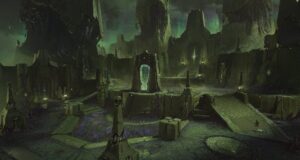Yuki Yuna is a Hero (Washio Sumi Chapter) – Episode 6

Hello folks, and welcome back to Wrong Every Time. Today I announce with great trepidation that we are returning to Yuki Yuna is a Hero, and concluding Togo’s ill-fortuned first tour as a defender of the divine tree. In the early episodes, I occasionally felt eager for the other shoe to drop, to at least save us from the anxiety of watching these girls come to care for each other, knowing the cruel fate awaiting them. Now I know I was too naive; this production’s mastery of torment is simply too well-honed, its hooks barbed with a heart-rending acuity of convincing, incidental characterization. I was able to genuinely believe in the bond between these three, and that has made the fallout all the harder.
Now, with Gin having nobly sacrificed herself to an ignoble cause, our two remaining heroes stand awakened but depleted. Even if they were to challenge the authority of the divine tree, what would be left for them? They exist wholly within its sphere of influence, and to falter now would be to betray the faith Gin fought and died for – not as a sacrifice to the divine tree, but as a proud defender of her friends and family, who would give everything without question that the people she loves might carry on. We cannot always choose our cause, but that is not to say we can’t choose our conviction; for Togo and Nogi, the fight continues for Gin’s sake, and for all the dreams they once shared.
Episode 6

We open on still shots of the natural world they are ostensibly fighting for; an aerial shot of fog in the valleys, morning dew glistening on flower petals, the gentle rustle of a stream. A sequence of solemn tranquility, like the process of cleansing Togo undergoes every day at her estate. This world is beautiful, but is it truly this world they are fighting for? Though they act with priestly solemnity and absolute humility, are their efforts returned in kind? No god has ever extended to us a reflection of the grace and sacrifice we offer in their service; if they feel any fragment of responsibility towards us, it remains unspoken
We cut down to a mountain pool, revealing this is indeed another version of Togo’s cleansing ritual, with both her and Nogi bathing under the falls. Nogi still maintains her mission-committed affectation; Togo’s thoughts are elsewhere, reflecting back on the reveal of their “new equipment”

The bloom system really is uniquely monstrous. You can imagine the gods conferring over their sacrifices, thinking “alright, we’ve already tricked them into sacrificing their lives for us, is there anything more we could take from them?” And of course, the answer they arrive at is the bloom – to rob their devotees of their faculties piecemeal, that they may endure beyond conventional death, and be worshipped as objects once their limbs have failed them
“Not everyone can use this gift. You must be able to identify with the Shinju-sama at a very high level, so it can only be used by a very small amount of selected people.” Our knowledge of Togo’s second adventure reveals these words as a bald-faced lie – anyone can activate the bloom system, and the Divine Tree is happy to accept their sacrifices. But of course, telling these young true believers that they are uniquely capable of accessing this power will likely solidify their faith all the more, so the Divine Tree specifically instructs its avatars to lie to the girls, assuring them they are privy to some “secret knowledge” in the same way religions across history have dangled false carrots for true believers

It’s certainly a distinct effect, following Yuki Yuna’s first season with this prequel that comes necessarily drenched in dramatic irony. Everything these girls are taught to believe in or hope for is already known to us as a self-serving lie; the cruelty of the Divine Tree is felt all the more acutely, because we understand precisely how it is manipulating these girls at every step
As such, the introduction of the faeries and bloom system is adorned in extravagant ritual ceremony, all entirely unnecessary. As we well know, the faeries themselves only exist for one reason: to prevent those who’ve come to understand the bloom system from killing themselves, and stopping the divine tree from extracting further sacrifices
Togo has trouble keeping a brave face at this, and remarks that these new weapons have come “too late” (for Gin) before correcting herself

“There’s nothing much I can do other than this.” At home, Togo cooks to maintain some semblance of control over her life
Her adopted parents put on a brave face, but even they are troubled by how much Togo is being put through. Even in this inhumane system, our individual bonds prove we are more than machines, that we are capable of a compassion our overseers cannot recognize
Ah, this is heartbreaking. The following scene affirms this truth, as the girls’ classmates unfurl a banner reading “Our Heroes, Hang In There.” In spite of everything they’ve been taught, they know this system is cruel and wrong, and that their friends deserve better than this. While current global events are certainly shaking my faith in people, there is at least a light in most of us, a sense of obligation to our fellow man that our false gods can only do so much to stamp out

“Your duty will be over someday, right?” “Then we can hang out normally, right?” Aw jeez
The girls enjoy at least a bit of carefree nonsense as they admire the town’s Halloween decorations – but even this joy is tempered by contrasting cuts of their teacher visiting their parents, and revealing the horrible true nature of the bloom system
Both the twilight colors and autumn leaves falling evoke a sense of things ending as the call for battle comes through
And Nogi hands off her ribbon, the one thing that will connect them after all this horror is past
“Compliment me if I look good with it, okay, Sonocchi?” Really digging that knife in, huh

Thoughts of performing for the Divine Tree’s benefit are now long behind them. Now their only vows are to each other – to protect each other, and both come home safe. A truly honorable cause to die for, in a world that sees us as nothing but fuel for amoral machines
There are three vertices this time, and they appear to follow a nautical theme – one resembles a jellyfish, the next a stingray, and the third a starfish. A fine choice of theming; the ocean is basically an infinite source of real-world creature designs that appear summoned from a distant solar system
Their new costumes and weapons are quite impressive, combining lots of shrine maiden aesthetic embellishments with jumpsuits that make them look like mecha pilots

The jellyfish-like creature actually treats this world like a great sea, breaching and crashing through the ground like a dolphin leaping through surf
Both of them are forced to bloom as their enemies unveil combo attacks, flooding the arena with gas and then igniting it with electricity
Their bloom forms are indeed impressive, and continue this battle’s general sea theme, as both of them appear like the captains of mechanical barges bearing a host of weapons
The sacrifices have already begun; Togo has lost her legs, and Nogi her eye. The divine tree “helpfully” augments their suits with new features, that they may keep fighting even as their bodies are destroyed

The final vertex opens to reveal a swarm of those lesser devils from the end of the original series, forcing a second bloom from our heroines. It’s as if the vertices and Divine Tree are working in tandem to cultivate sacrifices, a fitting metaphor for the general relationship between avowed acolytes or patriots and the organizations they serve. For those who only seek to cultivate loyalty, with no concern for the actual fate of their followers, perpetual war is actually a useful contrivance
Nogi falls again, and her arm is claimed by the hungry divine tree
She realizes this is all wrong, but what can either of them do? And just as intended, Togo’s loyalty to Gin prompts her to continue sacrificing. Once these girls start dying, the divine tree’s work is much easier, as the survivors will fight on in their absent friends’ honor

Nogi chases the last enemy to just short of the wall, and steps through to learn the awful truth of the universe
Ah, I see. Togo’s second bloom doesn’t take more of her body – it takes her memories, robbing her of the knowledge of Nogi
“The three of us are friends. We’re BFFs.” Oof, this is heartbreaking. Nogi explains their bond as a last gesture to Togo, hoping some fragment of the love they shared will carry on, knowing she will not live to see Togo’s future. They give each other everything they have to give
Back in the real world, we see the fallout – Togo with no knowledge of herself, and the bridge collapsed in the battle
We end where we began, with Togo meeting Yuna for the first time

And Done
Aaaargh, what a bitter, painful, utterly senseless tragedy! And what a powerfully compassionate note to end such a hopeless journey! You might frame a story as grim as this as cynical, but I feel like it is anything but – it is the furious, desperate stories like this that love people most of all, that see the horrible contortions this world twists us into, and rage with all their might at such a system, that future innocents will know not to be fooled by such monstrous overlords.
Yuki Yuna is a ferocious argument against surrendering your agency and humanity to an arbitrary higher cause, be it the false assurance of religion, the unearned calls to loyalty of patriotism, or, god forbid, the fundamentally anti-human calculus of capitalism. What is most beautiful and powerful within us can indeed be requisitioned by such forces, and that is the great terror of modern existence – that these forces we have created, forces which have no meaningful value beyond their own propagation, might harness the beauty of our mutual concern to their own ends. Our compassion must be directed towards those who have earned it, to the people we love within our own lives, and to the communities we build together, through the compassion of our spirit and strength of our own hands.
All that is noble is realized in miniature through our daily interactions; it is how we treat each other, the kindness and consideration we embody in the everyday, that makes us truly magnificent. And when we turn that compassion towards a grander scale, it must be invoked in a spirit of true humanism, knowing that it is not any grand overseer that deserves our loyalty, but the billions of others who are struggling just as we are, who might have misplaced their faith, but who nonetheless seek a better life for themselves and their loved ones. We owe no god or king a fraction of what we owe our neighbors; the essence of what makes us noble is contained in that final/first interaction, of Yuna reaching out and helping a friend in need.
This article was made possible by reader support. Thank you all for all that you do.








